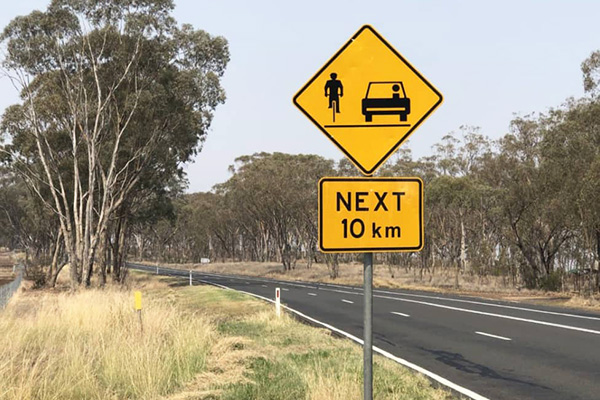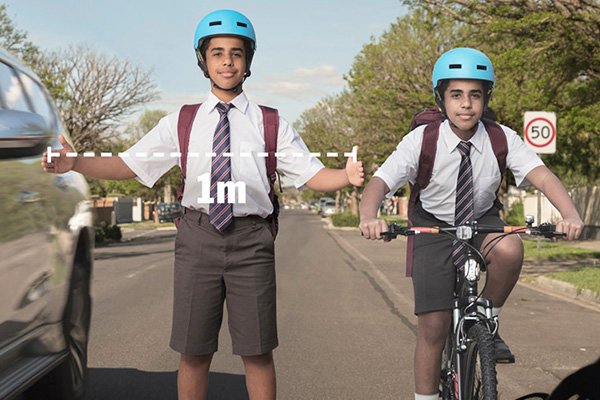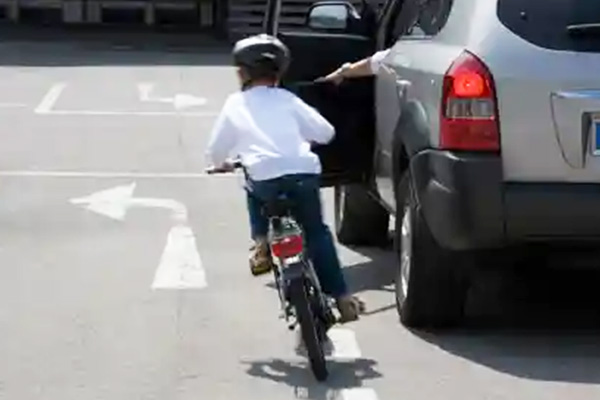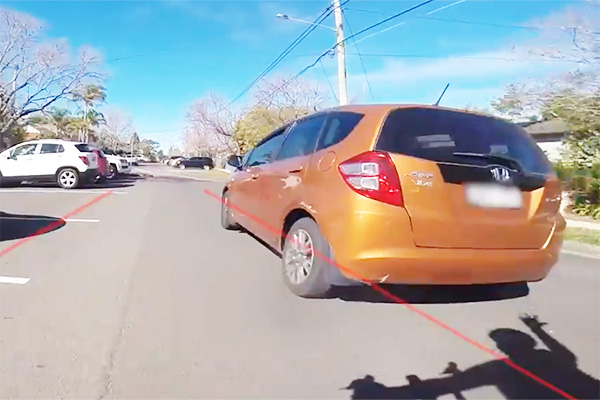One metre still matters but awareness and enforcement of Minimum Passing Distance legislation has stalled.
Where’s the shoulder? Photo credit, Drive Magazine
Minimum Passing Distance legislation (MPD) states that drivers must give bicycle riders at least one metre space in 60 km/h zones and 1.5 metres above 60km/h. But we know this isn’t happening. The Sydney morning Herald reported record cyclist injuries (23%) compared with motorists. And even Drive Magazine stated that, ‘dangerous behaviour from drivers is a major threat to cyclist safety’.
Indeed, “most cyclists' complaints to NSW police about aggressive driving are not investigated,” says John Hawkins, Chair of the Bicycle NSW Advocacy Committee.
MPD enforcement and education works
As a behaviour-change tool, the MPD enforcement and education trial in 2016 was proven to make cycling safer. Principally, the motorists and cyclists involved found the speed and distances appropriate. While drivers occasionally found the rule difficult to apply, there were no calls to drop it. The evaluation also found that MPD compliance could be improved by further public education and evaluating enforcement approaches. Indeed, Bicycle NSW has a number of suggestions to improve MPD enforcement and education. With cyclists representing a quarter of road crashes, road safety is a serious problem. But the police need to see that there is a problem.
Give a metre. Image credit, Transport Action Commission
Since the law was passed in 2018, police have only issued 171 fines to motorists for driving too close.
However, since 2016, cyclists have received about 55,000 fines for a range of offences: for not wearing a helmet or not having it correctly fastened (31,402 penalties); riding on the footpath (5645 fines); riding at night without a light (5678) and not having a working bell (2476). There have also been 207 fines for “not riding on the far-left side of the road”.
Where to go - The door or the traffic? (image credit, The Guardian)
There’s a cultural problem
Either police lack training or are unwilling to enforce MPD rules. John Hawkins says, “There’s a disconnect between the welcome support at senior levels of policing and the treatment received from officers at ground level when riders seek their help.”
“Cops like easy targets. And cyclists, who tend to be law-abiding, don’t run away. In comparison, policing the source of the greatest harm to riders – poor driving – often seems like too much work,” said John Hawkins.
“An enduring theme is that complaints are dismissed as unprovable without any effort to properly examine the evidence.
Further, there have been multiple instances where riders have been victim-blamed, with some even being threatened with bogus traffic offences to make them go away. This needs addressing urgently…” John Hawkins.
“Operations like the West Midlands Police blitz would help offset the damage from cyclist over-policing campaigns like Operation Pedro.”
Moreover, motorists don’t know the 1 metre rule, or understand the overtaking exception
“While there was plenty of media coverage during the MPD trial period, there has been almost nothing since”, said Hawkins. “As a consequence, close passing rates continue to escalate with people returning to business as usual post-pandemic. It is particularly bad from heavy vehicles.”
“Impactful road safety messaging to remind drivers of their responsibilities to vulnerable road users is urgently required. Some promising advertising videos have been prepared, but I see little indication they are reaching the required target audience. Having gone to the effort of making a video, I don’t understand why you would then cheap out on maximising its reach.”
“This is an urgent priority. Enforcement alone won’t cut it- Especially when enforcement is so poor,” said John Hawkins.
There is also the matter of entitlement. Because motorists get the message that bikes don’t belong. Therefore aggression against them is okay.
This car has just passed David Page well within the 1m tramlines indicated by the red lines in the video footage (Source: Sydney Morning Herald)
What can bicycle riders do to make 1 metre matter again?
Whether you have a camera or not, MPD violations are difficult to land. Chances are your case will be rejected outright. So, temper your expectations. But to highlight the problem and push for change, reporting is vital. Here’s a strategy to guarantee that your close pass generates a response and follow-up from the police.
Whether you have video or not, you can:
- Report to a police station
- Call Police Assistance line on 131 444
- Call Crime Stoppers on 1800 333 000
Got video? Great. But the burden of evidence is high, and you’re expected to do all the forensic work. Which means returning to the site CSI-style to get reference points. No video? That’s fine too. A witness may have recorded it on their phone. Regardless, record all details:
Your contact details; Exact address of incident; Time of day; Direction you were travelling; Position on the road; Your visibility; Make, model, colour and rego of car; Description and behaviour of driver; Direction of car; What the driver did before during and after incident; What you did, ditto; How close was the pass? Any witnesses? Was there dialogue? Were there gestures? What was the physical and emotional affect upon you?
MPD campaign in Orange NSW , 2017 with artwork explaining that 1 metre matters.
We need your help!
Your report and follow-up are vital for our advocacy for education and enforcement of MPD.
- Join Bicycle NSW now
- Sign up to our campaign for Better Streets
- Donate to the Environmental Trust which funds our advocacy campaigns for safer infrastructure and a healthier environment.






